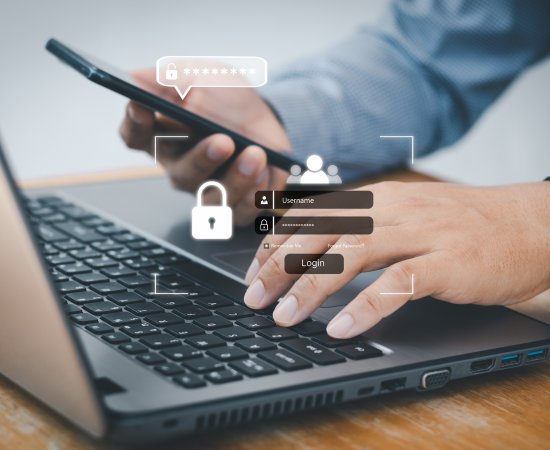The rise of remote work has transformed how businesses operate, offering benefits such as increased flexibility, reduced commuting time, and the ability to tap into a global talent pool. As more employees work from home or other remote locations, ensuring robust cybersecurity remote work measures has become critically important.
In remote work settings, good cybersecurity protects sensitive data, maintains privacy, and prevents cyber threats that can disrupt business operations. In this guide, we’ll provide essential tips for remote work to help you, your business and your employees effectively safeguard the digital workspace, minimise the risks of cybersecurity remote work, and ensure a secure and productive work environment.
At Woodstock IT, our highly skilled and professional team offers tailored IT security audits, data backup and recovery, antivirus software, encryption, and cybersecurity training services to businesses. Don’t hesitate to contact us to learn more about how we can help you navigate hybrid and remote working.
What are the risks to cybersecurity remote work?
For businesses and employees, the challenge is that remote work environments create larger attack surfaces, and there can be limited oversight of data use, making them vulnerable to security risks.
Remote workers face security risks such as:
- phishing attacks
- unsecured Wi-Fi networks
- malware, including ransomware
- weak passwords (easily exploited).
These risks can lead to remote workers giving unauthorised access to sensitive data or clicking on malicious links that can infect devices and cause operational disruptions, financial losses, and reputational damage. Now more than ever, businesses need cybersecurity remote work measures to protect personal and company data to enjoy the benefits with greater peace of mind.
Cybersecurity tips for remote work
1. Use strong and unique passwords
A strong password includes upper and lowercase letters, numbers, and special characters, making it difficult for hackers to crack. Remote workers must have unique passwords that are also regularly changed, minimising the time a compromised password can be exploited.
Password managers can be useful because they store and encrypt passwords, allowing unique passwords for each account without requiring a person to remember them all. As you emphasise the importance of passwords, encourage remote workers to avoid common mistakes, such as using easily guessable information (e.g., “password123”) or writing them down in obvious places.
2. Use anti-malware and antivirus software
Employers should provide staff who work remotely with reputable antivirus and anti-malware software and encourage them to keep the software up to date to protect against the latest threats. Where possible, devices should be scanned regularly to help prevent data breaches, and many programs can monitor devices in real time.
With various software options available, consider consulting a cybersecurity specialist to ensure you get the best protection for your setup.
3. Keep systems and programs up to date
Software updates often include patches for known vulnerabilities that hackers could exploit. Regularly updating your software (operating systems, apps) protects your system from these potential threats and ensures it operates smoothly and securely.
Enabling automatic updates is a simple way to ensure software stays current on remote work devices, minimising the risk of cyberattacks.
4. Prioritise wi-fi and network security
When working remotely from home, it’s important that the Wi-Fi network has password protection to prevent unauthorised access and that WPA3 encryption is enabled on the router if it’s supported. The router’s firmware should also be regularly updated. Remote workers could also consider using a VPN (Virtual Private Network), which can make it more difficult for hackers to intercept data.
Whilst they should be avoided, if it’s absolutely necessary to use public wi-fi networks to complete a work task, always connect through a VPN and don’t complete any sensitive transactions.
5. Be aware and limit access
When working out of the office, choosing a working space that allows for privacy and prevents others from viewing sensitive information, passwords, private documents, and even online meetings is important. If you must leave your device, ensure it is locked and password protected.
If remote working occurs at home, work devices should remain separate from personal computers and personal devices, and only the employee should have access and know the login credentials.

6. Enable multi-factor authentication (MFA)
Implementing MFA significantly reduces the risk of unauthorised access, protects business information, and enhances the overall security of a remote work environment. MFA essentially adds an extra layer of security by requiring a second form of verification in addition to a password. These include time-based codes sent by SMS and authenticator apps. If a hacker obtained a password through a phishing attack, they would still need the second form of verification to gain access.
7. Use secure communication channels
Using encrypted communication tools for email, messaging, and video conferencing is one of the best ways to safeguard business data from cyber threats and to protect privacy while working remotely. Encryption transforms data sent over the internet into a secure code, preventing unauthorised access. There are many options available for end-to-end encryption across different platforms. As with all software, it should be kept updated to protect against vulnerabilities.
8. Stay informed about phishing scams
Phishing scams typically use urgent language, come from suspicious email addresses, and request personal information. They present a significant threat to remote workers, who need to be aware of how to spot them and take action to help protect work devices and data. It’s best practice to be cautious when opening emails and attachments and to avoid clicking on suspicious links or downloads from unknown sources. As phishing scams get more sophisticated, it’s imperative to ensure antivirus software is up to date to stay protected against new threats.
9. Provide staff education and training
Employers should be proactive and schedule regular cybersecurity training to help staff stay safe online and protect business data when working remotely. Training can include examining common signs of phishing scams and preventable data breaches and encouraging staff to report any suspicious activities.
Regular training sessions can also provide an opportunity to reinforce company policies and procedures, ensuring that all employees are aligned with security goals. Learn why annual cybersecurity training isn’t enough.
10. Schedule regular data backups
Regular data backup ensures that businesses have access to the latest versions of files in the event of data loss due to cyberattacks. This helps maintain business continuity and reduces the downtime associated with data recovery. Choosing reputable backup services that provide encryption to protect your data during transfer and storage is essential.
Managing remote workers and devices
When businesses employ remote workers or use a hybrid working model, a comprehensive cybersecurity policy should be established to ensure remote working is done as safely as possible. An effective policy should include strong, unique passwords and multi-factor authentication (MFA). Businesses should also offer regular cybersecurity training to ensure employees are aware of the latest threats, how to mitigate them, and how to report them to IT.
Businesses can also enable remote device management, which allows IT departments to monitor, update, and secure devices remotely, ensuring compliance with security policies.
Get a free, no-obligation quote
At Woodstock IT, our specialist team can fully manage your cybersecurity to ensure your business is secure and that risks are minimised. By being prepared and proactive, we can protect sensitive data and maintain continuity with remote work, even in the face of cybersecurity threats.
Contact us today to discuss your requirements and learn more about our cybersecurity services, tailored for businesses of all sizes.


